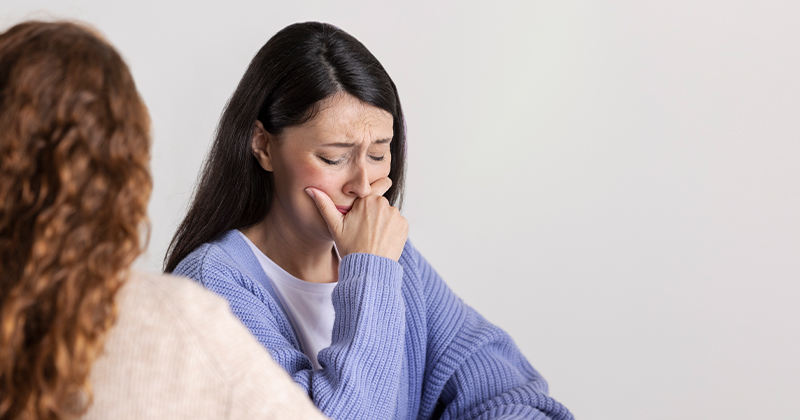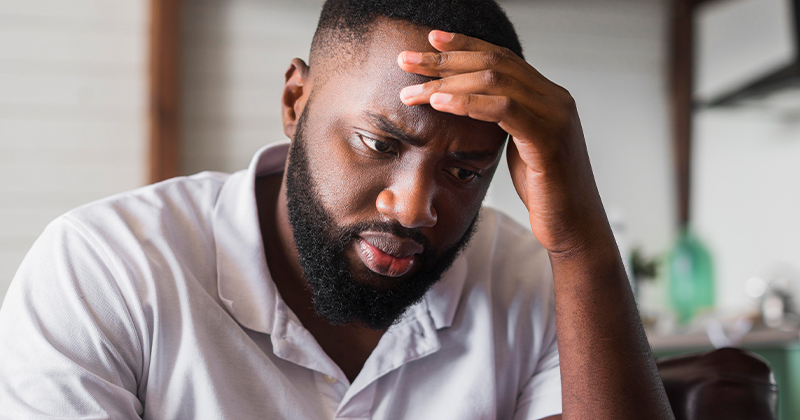Anxiety Treatment
“Never let the future disturb you. You will meet it, if you have to, with the same weapons of reason which today arm you against the present.” — Marcus Aurelius
If you’re living with anxiety, you deserve treatment so that you can get through your day without fear. With more than 30 locations in Louisiana and beyond and more than 34 thousand clients treated annually, Oceans Healthcare has the expertise you need to get the treatment you deserve.
The Oceans Experience
Oceans is committed to providing quality behavioral health in a safe environment. With our telehealth capabilities we can conduct therapy, education and diagnosis via phone or video. We accept Medicare, TRICARE and most private insurance.
What We Treat: Anxiety Disorders and Co-Occurring Substance Use
Anxiety occurs when you experience feelings of dread, uncertainty, uneasiness, and fear. Some level of anxiety is normal, for example when you’re in a stressful or uncomfortable situation. An anxiety disorder happens when you feel anxiety regularly that goes beyond what the situation calls for. An anxiety disorder gets in the way of completing usual tasks and causes undue stress in daily life. You may be diagnosed with different types of anxiety disorders, depending on your symptoms and their frequency.
When an anxiety disorder goes undiagnosed, you may find yourself self-medicating to manage your symptoms. While substance use can feel good in the short term, it makes symptoms worse after a while. At Oceans Healthcare, we treat anxiety disorders, substance use disorders (SUDs), and co-occurring disorders.

How We Treat: Therapy and Medication Management
When it comes to treating anxiety disorders, we understand that everyone has different needs. That’s why we will work with you to develop your unique treatment plan.
Therapeutic Methods
At Oceans Healthcare, we use cognitive behavioral therapy (CBT) to treat anxiety disorders and co-occurring conditions. CBT is an evidence-based, proven treatment method for anxiety. In CBT you’ll learn about the relationship between your thoughts, feelings, and actions. You and your therapist will work together to identify and change negative thought patterns and behaviors. This helps you manage emotional reactions.
We also use group therapy. In a group, you will have the opportunity to connect with people going through similar experiences. This practice is designed to show you that you’re not alone in your experience with anxiety. You and your cohort will support each other through difficult times and celebrate wins together.
Medication Management
All of our clients at Oceans Healthcare will be assigned to a board-certified psychiatrist who can assist with medication management. In combination with therapy, medication is an important part of managing an anxiety disorder.
Common types of medication used to treat anxiety include select serotonin reuptake Inhibitors (SSRIs), beta-blockers, and antidepressants.
The Oceans Six Promise
We have six fundamental principles that guide every step of our treatment process.
- Teamwork. We’re stronger clinicians when we work together. At Ocean, you’ll have a whole team of professionals working with each other, sharing ideas and progress throughout your healing journey.
- Dignity. We believe everyone should be treated with dignity, compassion, and respect. We honor our patients, their families, and our team members by creating a space of mutual understanding.
- Comprehensive care. We know that building a healthy body is part of building a healthy mind. Because of our roots in geriatric care, we emphasize the mind-body connection, and each of our treatment plans is designed for a lifetime of recovery.
- Quality. Our board-certified psychiatrists and clinical staff are always finding ways to improve, looking for unique and efficient ways to treat each client.
- Integrity. We are 100% transparent about everything we do, for our patients, from our treatment plans and diagnoses to the way we handle finances. You play an active role in your treatment every step of the way.
- Advocacy. The Oceans Healthcare team advocates for our clients so their needs are met here and in their own communities.
What Are the Types of Anxiety Disorder?
There are multiple different kinds of anxiety disorders. Although a lot of symptoms overlap, each condition is unique. Some common anxiety disorders are:
Separation anxiety disorder. While most common in children, this condition can occur in people of all ages. It is described as an intense fear of being apart from a loved one, like a parent or spouse. It usually involves a fear of something bad happening to themselves or the person while they are not together.
Social anxiety. If you’re living with social anxiety, you feel overwhelmed or embarrassed in situations. You nitpick your interactions with others or obsess over what you do and say. Your fear of being judged leads you to avoid crowds or even small groups.
Generalized anxiety disorder (GAD). This is one of the most common types of anxiety. GAD is characterized by intense worry about life stressors like work, school, or other daily tasks. This worry interferes with your ability to accomplish tasks that are easy for others.
Panic disorder. People with this condition experience extreme and sudden fear when there is no real danger around. This results in panic attacks where you sweat, tremble, and even hyperventilate. With panic disorder, you could experience panic attacks once or twice a year or multiple times per day, depending on the severity of your condition.
Phobias. With this condition, you fear a person, place, or thing to an extreme degree. Common examples of phobias include fears of the dark, spiders, clowns, heights, and much more. Someone with a phobia experiences a sense of danger when they are faced with the object of their fears
How Common Are Anxiety Disorders?
Anxiety disorders are one of the most common mental health conditions experienced by Americans. In 2023, over 32% of U.S. adults aged 18 and older experienced symptoms of anxiety and/or depression.
This was most common among young adults aged 18-24. Almost half of all people in this category reported experiencing symptoms of anxiety and depression. But anxiety doesn’t discriminate. Adults of any age can experience anxiety and other mental health conditions.

What Symptoms of Anxiety to Look Out For?
Symptoms of anxiety vary slightly depending on the specific type of anxiety that you have.
People with anxiety disorder experience psychological symptoms like overwhelming dread, irritability, nervousness, obsessive thoughts, and difficulty concentrating. These often lead to behaviors. This could look like avoiding situations that cause anxiety, compulsively checking in to make sure nothing bad has happened, or looking for constant reassurance.
Anxiety disorders also come with physical symptoms. Muscle tension, trembling, and insomnia (difficulty sleeping) are common examples.
What Is An Anxiety Attack?
An anxiety attack is not a clinically defined term, although it is often used to describe a person who is experiencing acute anxiety symptoms. This could include heavy sweating, nausea, difficulty breathing, and chest pains.
Usually when someone is referring to an anxiety attack, what they mean is a panic attack. A panic attack is more than just severe anxiety. Panic attacks have specific causes known as “triggers.” A trigger is something, usually associated with a traumatic event, that causes severe, overwhelming fear in a person.
Although a panic attack cannot kill you, many people report feeling like they are going to die. During a panic attack, you feel like you are choking and can’t breathe, like someone is sitting on your chest. You can experience a panic attack even if you do not have an anxiety disorder. Regular panic attacks, however, warrant medical attention.
How Can I Get My Anxiety Disorder Diagnosed?
You should be diagnosed with an anxiety disorder by a medical professional. This could be a psychiatrist, family doctor, or nurse practitioner. Your healthcare provider should take into consideration your mental health history, as well as any other health conditions when determining a diagnosis. You should receive a physical and bloodwork to rule out other things that could be causing your symptoms, like a thyroid problem or heart issue.
Your healthcare provider will compare your symptoms to the Diagnostic and Statistical Manual of Mental Disorders, Fifth Edition (DSM-5). If you meet the criteria for a specific anxiety disorder, and your doctor has ruled out other causes, they will diagnose you with an anxiety disorder.
An anxiety disorder diagnosis is nothing to be embarrassed by, and your doctor will work with you to find treatment options that best suit your needs. Our team at Oceans Healthcare can treat anxiety with therapy and medications in our mental health programs.
Get Help For Anxiety Disorders in the South Today
Getting diagnosed with an anxiety disorder is scary. Anxiety can overwhelm your life and leave you feeling trapped. At Oceans Healthcare, we’re ready to help you heal and develop skills to manage your anxiety. We want to empower you to move forward with your life and get back to the things you love.
Are you ready to start treatment for your anxiety disorder? At Oceans Healthcare, we accept referrals 24/7, so help is always within reach. Our team of board-certified psychiatrists and world-class clinicians is ready to work with you on a personalized treatment plan designed to help you reach your unique goals. Call us today to get started at 888-293-6899.

